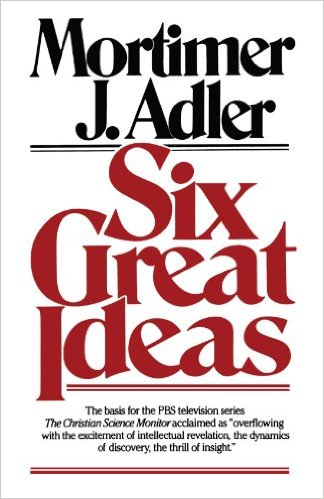|
Word Gems
exploring self-realization, sacred personhood, and full humanity
Dr. Mortimer J. Adler's
Six Great Ideas
|
The Ultimate Good: For something to be ultimate it must be that beyond which one cannot go. What can possibly occupy that unique place in the realm of goods?
|
return to 'Six Great Ideas' main-page

|
Editor's note:
Excerpts from Six Great Ideas are offered below, indented format; plus, at times, my own commentary.
|
For something to be ultimate in any dimension or direction,
it must be that beyond which one cannot go. What can possibly
occupy that unique place in the realm of goods?
We have observed that some goods are mere means, never
desired for their own sake, but only for the sake of something
else. Other goods, we have noted, are ends as well as means.
They are desired for their own sake as well as for the sake of
something else. Is there anything that either is or ought to be
desired for its own sake and never for the sake of anything else?
If so, that is the ultimate good, not just an end, but the end, the
final end beyond which one cannot go.
In antiquity, the word "happiness" was used as the name of
this ultimate good. The ancients paid attention to the obvious
fact that according to everyone's sense of what the word "hap-
piness" means, it names something desired for its own sake
and not for the sake of anything else.
It is impossible for anyone to complete the sentence "I want happiness because ..." except by saying, "I want it." Of anything else that one wants, it is always possible to say, "I want it because it will contribute to my happiness."
The ancients also observed that, while everyone uses the
word "happiness" to name that which is desirable solely for
itself and not as a means to anything else, individuals differ in
their conception of what happiness consists in. If, for the mo-
ment, we put aside our basic distinction between real and ap-
parent goods, there will be as many different conceptions of
happiness as there are differences with respect to the apparent
goods that different individuals want. Each is purely subjec-
tive, entirely relative to that individual's wants.
The miser who wants only money, or King Midas who wants
everything that he touches turned into gold, should accordingly
count himself happy when he gets what he wants. If he wants
money or gold for its own sake and if he wants nothing else, he
has achieved his goal. He has reached the end of his striving.
He has arrived at his ultimate good—his happiness. The same
thing can be said of the individual who identifies his happiness
with the enjoyment of sensual pleasures, or of the individual
who identifies it with gaining and holding power over others.
Once we come back to the distinction between real and ap-
parent goods, the picture changes radically. Far from achieving
happiness, the miser, the playboy, and the power-hungry in-
dividual have achieved only a counterfeit of it. They have got
what they wanted, but not what they ought to want. On the
contrary, getting what they want may have resulted in their
being deprived of many things they need and ought to want—
health, friendships, knowledge, and other goods of the mind.
Properly conceived (which means objectively rather than
subjectively conceived), happiness consists in having obtained
all the goods that everyone ought to want. So conceived, it is
the same for all human beings. It is the common good as well
as the ultimate good. It is the ultimate good because it leaves
nothing more to be desired, as it would if it were just one
particular good among others.
While life goes on, the pursuit of happiness can be defeated
by misfortunes of all sorts, or by mistaken choices on the part
of the individual. That is why the ancients placed happiness in
a whole life well lived—well lived as a result of the individual's
choosing as he ought for the most part and also as a result of
the individual's being blessed by fortunate external circum-
stances, again for the most part.
|
